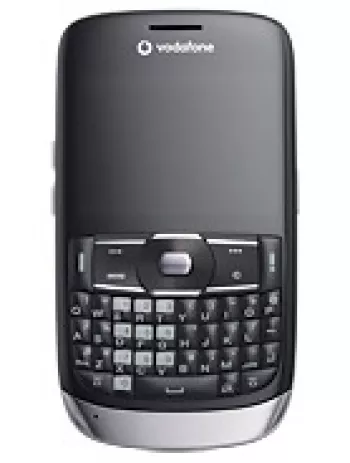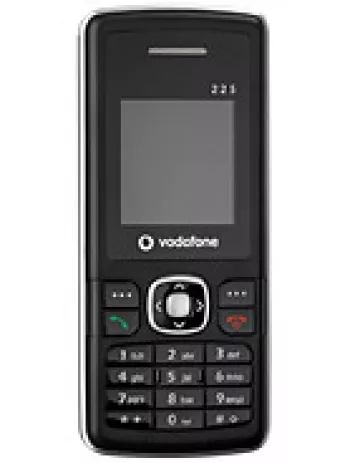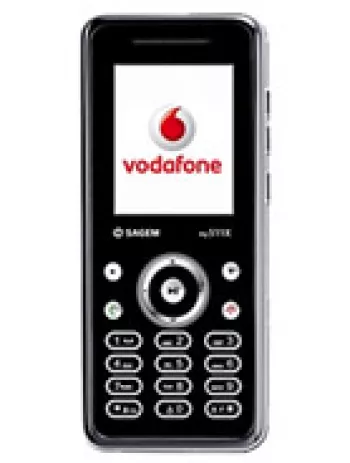
Overview
The Vodafone 526 Is a basic feature phone that was released in September 2008. It is a compact and lightweight device that caters to users who require basic communication functions without the complexities of modern smartphones. This device offers essential mobile features, packaged in a simple and affordable mobile handset.
Design and Build
The Vodafone 526 measures 107 x 47 x 11.8 mm and weighs only 70 grams, making it a highly portable device. Its compact dimensions and light weight ensure that it fits easily in the pocket, making it ideal for users on the go. The phone uses a Mini-SIM and has a minimalist design with a straightforward user interface, targeted at providing simplicity and ease of use. The phone is available in classic black color, giving it a sleek and timeless appearance.
Display
The phone features a 1.7-inch CSTN display that supports 65K colors. With a resolution of 128 x 160 pixels and approximately 121 ppi pixel density, the display offers basic visual clarity. The screen-to-body ratio is around 18.1%, which is typical for devices in this category, emphasizing the main function of texting and calling while providing a limited media display capability.
Network and Connectivity
Connectivity options for the Vodafone 526 are limited by today's standards. The device operates on GSM networks and supports GSM 900/1800 bands. It offers GPRS Class 10 for basic internet connectivity but lacks the high-speed EDGE technology. The lack of advanced connectivity options such as WLAN, Bluetooth, or GPS showcases its focus on fundamental mobile phone functionalities.
Camera
In terms of photography capabilities, the Vodafone 526 comes with a basic VGA camera. While it features no video recording functionality and lacks a front-facing camera for selfies, the rear camera can be useful for taking simple snapshots. However, image quality is expectedly limited, reflecting the phone’s focus as a communication tool rather than a multimedia device.
Performance and Memory
The Vodafone 526 is equipped with internal storage of 1.5MB, which is mostly sufficient for saving contacts and messages since the phone does not support additional storage via a memory card slot. The phonebook can store up to 500 entries, allowing users ample space for their contacts. Additionally, the device provides call log features, including 20 dialed, 20 received, and 20 missed calls.
Battery Life
The device is powered by a removable Li-Ion 670 mAh battery, promising a reasonable battery life for a feature phone. It offers up to 220 hours of standby time and up to 3 hours of talk time, indicating a reliable performance for basic use throughout the day. The user-friendly nature of a removable battery further enhances its practicality, allowing users to replace the battery if needed.
Sound and Communication
The Vodafone 526 does not feature a loudspeaker or a 3.5mm headphone jack, indicating a minimalist approach to audio. Its sound capabilities are designed primarily for ringtones and alerts rather than multimedia entertainment. Messaging on the device includes SMS and MMS, supported by a WAP 2.0/xHTML browser for simple internet browsing.
Lack of Advanced Features
The feature set of the Vodafone 526 emphasizes its role as a straightforward communication tool. It lacks advanced features, such as sophisticated sensor arrays, modern app functionality like Java support, and gaming capabilities, aligning with its positioning in the market as a low-cost, entry-level device.
Conclusion
The Vodafone 526 exemplifies the traditional feature phone, focusing on fundamental communication utilities without incorporating the complexities of a smart device. Ideal for users seeking reliability and simplicity, it promises a nostalgic step back to an era of straightforward mobile telephony where phone calls and basic messaging were king. As such, it serves as a reminder of the evolution of mobile technology and the enduring importance of simplicity and ease of use in design.
Key Features of Vodafone 526
- Compact and lightweight design with dimensions 107 x 47 x 11.8 mm and weight of 70 g.
- GSM technology supporting 2G bands (GSM 900 / 1800).
- Supports GPRS Class 10 for data connectivity.
- CSTN display with 65K colors, 1.7 inches in size, with a resolution of 128 x 160 pixels.
- Phonebook capacity for up to 500 entries.
- VGA main camera for basic photography.
- SMS and MMS messaging capabilities.
- WAP 2.0/xHTML browser support for lightweight internet browsing.
- Removable Li-Ion 670 mAh battery offering up to 220 hours of standby time and up to 3 hours of talk time.
Vodafone 526 Drawbacks
- Lacks EDGE connectivity for faster data speeds.
- The display is CSTN with only 65K colors, providing limited color depth and viewing angles.
- No expandable memory via card slot, with only 1.5MB internal storage available.
- VGA camera, which does not support video recording, offering basic photo capabilities only.
- No loudspeaker and no 3.5mm headphone jack, limiting audio options.
- Absence of modern connectivity options such as WLAN, Bluetooth, and GPS.
- No FM radio availability for entertainment.
- Uses a proprietary USB port instead of a standard micro USB or USB-C.
- No built-in sensor support, limiting advanced functionality.
- Lacks Java support and does not come with pre-installed games.
- Discontinued status, making it difficult to find customer support or replacement parts.

View Also
More Phones
All Rights Reserved +13916 Phones © Mobilawy 2025
























